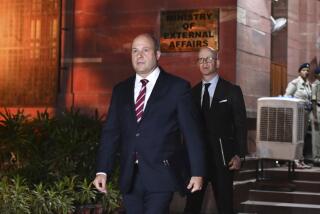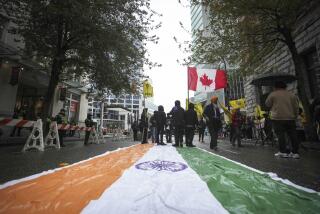Kashmir Feud Troubles U.S.
- Share via
WASHINGTON — Senior State Department officials are growing increasingly troubled by deteriorating political conditions in South Asia, as India said Saturday that it was expelling the Pakistani ambassador to New Delhi and thousands of villagers fled fighting in the disputed Kashmir region.
“We have repeatedly stated our strong concerns about the potential for conflict between India and Pakistan,” Jo-Anne Prokopowicz, a State Department spokeswoman, said Saturday. “We continue our long-standing effort to lower tensions between India and Pakistan, and encourage them to engage in a dialogue.”
The two nuclear-armed neighbors have long been at odds over Kashmir, the Himalayan region split between them. Fighting in the area escalated last week to its highest level this year, causing officials in Washington as well as in South Asia to wonder whether the area was again on the brink of all-out war.
To try to calm matters, Secretary of State Colin L. Powell spoke in recent days by telephone with Indian and Pakistani government leaders, Prokopowicz said.
In addition, she said, Christina B. Rocca, assistant secretary of State for South Asian affairs, returned Thursday from the area after high-level attempts at mediating the growing crisis.
“The United States, including Secretary Powell, is very engaged in this region,” Prokopowicz said, adding that the nuclear capabilities of both countries remained among the top U.S. concerns.
Asked for an official U.S. comment about the ouster of the Pakistani ambassador to New Delhi, she said: “We’re looking at the macro picture. We are engaged and concerned, and we are hoping that the Indian and Pakistani governments continue their open dialogue.”
Kashmir has long been a political trouble spot between India and Pakistan. India is mostly Hindu; Kashmir, like Pakistan, is predominantly Muslim. India and Pakistan have fought two of their three wars over the region.
Indian Prime Minister Atal Behari Vajpayee met Saturday with his senior Cabinet ministers and intelligence officials in New Delhi, trying to come up with a response to an attack on an army camp Tuesday that killed more than 30 people. India blames the attack on Pakistan-based Kashmiri separatists.
After the sessions ended, the prime minister announced that Pakistan’s ambassador to India was being ordered out.
In December, India pulled its ambassador from Pakistan after a militant assault on the Parliament complex in New Delhi. Since then, the rivals have cut back their diplomatic corps, halted airplane flyovers and stopped rail service between the countries.
With both sides facing off, Pakistan’s ambassador to India, Ashraf Jehangir Qazi, has remained in the Indian capital, even though Indian government officials have declined to meet with him.
But India’s foreign minister, Jaswant Singh, said Saturday that because India no longer has an ambassador in Pakistan, it was time for the Pakistani ambassador to leave India “for the sake of parity of representation between the two countries.” Qazi was given one week to leave.
Singh was one of the Indian officials to whom Powell had been reaching out in an attempt to ease tensions.
In Islamabad, the Pakistani capital, a Foreign Ministry spokesman told state-run television that the diplomatic expulsion would serve only to increase ill feelings.
“Actions like these add to tensions, whereas efforts should be made to reduce tension,” said the spokesman, Aziz Ahmed Khan. “Pakistan, despite this action of India, which has disappointed us, will continue to strive to resolve all issues with India through peaceful negotiations and through peaceful means.”
Fighting along the frontier in Kashmir intensified Friday night and Saturday, and an estimated 10,000 people were forced to flee their homes as both sides used heavy artillery to pound selected targets, Singh said.
Separatists in Kashmir have been fighting for years for independence from India or merger with Pakistan.
*
Associated Press contributed to this report.
More to Read
Sign up for Essential California
The most important California stories and recommendations in your inbox every morning.
You may occasionally receive promotional content from the Los Angeles Times.











